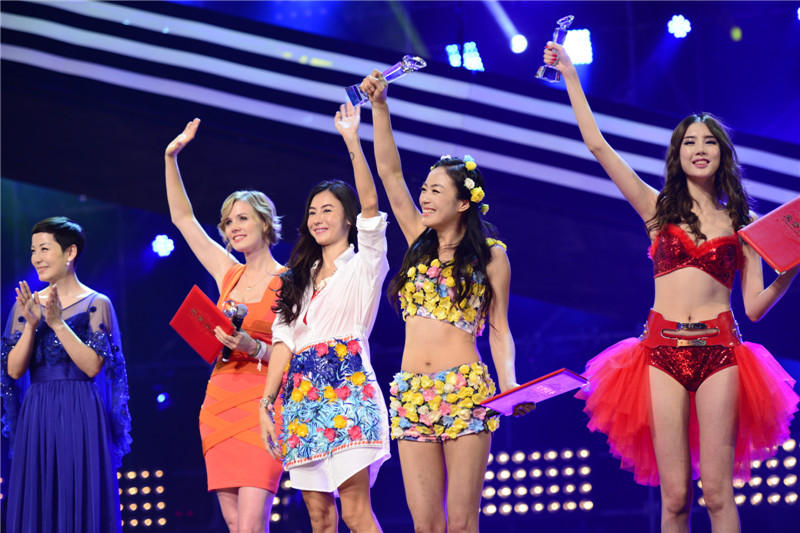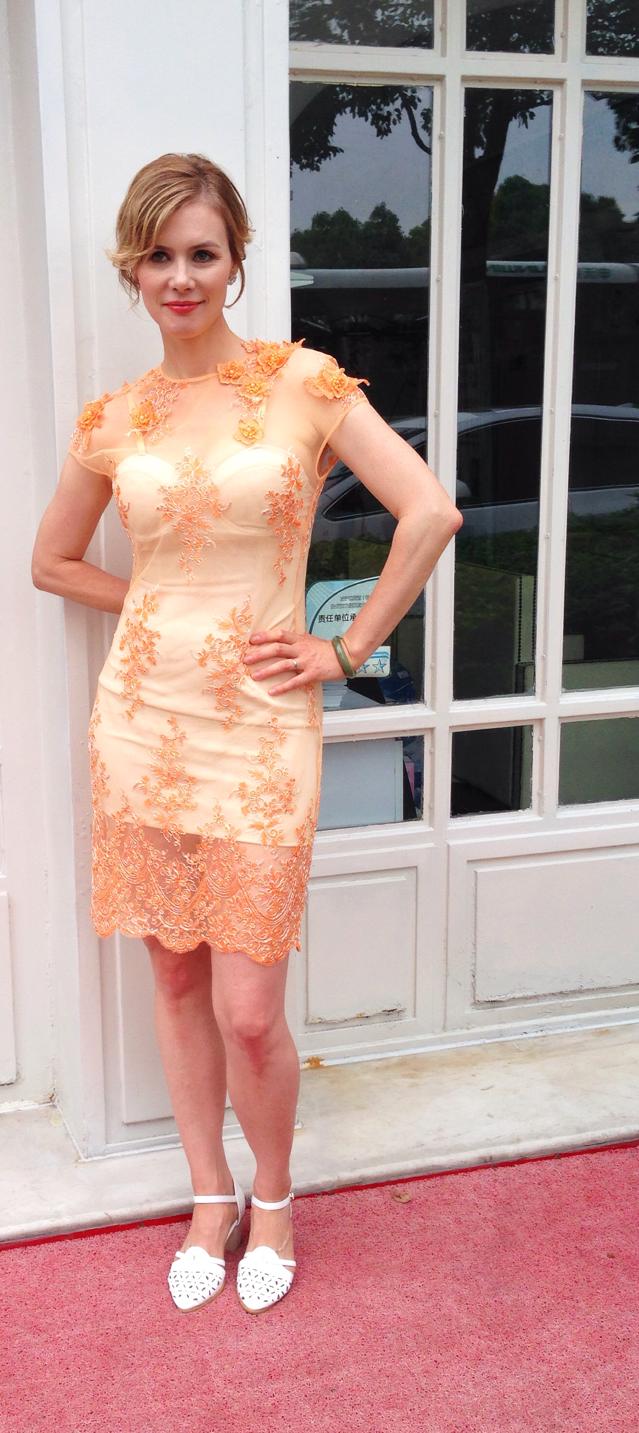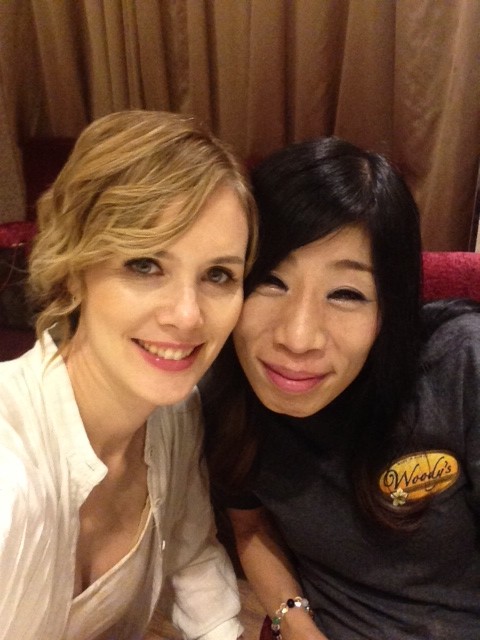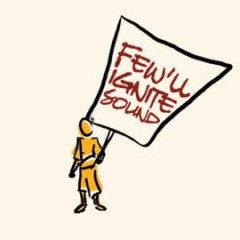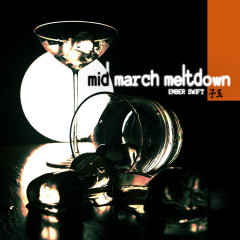Spat Out by Chinese TV: Part 3
“You are as pretty as Nicole Kidman,” said the choreographer with a huff. It took me a moment to realize she was talking to me. “But you have no idea how to move your body. You could look so pretty if you just relaxed. Be more sexy! Flirt with the camera! Get into it!”
I love the criticism-couched-in-a-compliment technique. Crafty.
I did an exaggerated porn-style pose—aka: super tart—and hoisted up my ample breast and stuck out my butt. Everyone howled. She put her hand over her mouth in embarrassment.
“Is this what you’re looking for?” I was being cheeky. The other mothers laughed harder.
“Maybe tone it down a little,” she said through her fingers that were still loosely across her mouth in horizontal prison bars of disbelief. In such a sexually repressed culture, they want their mothers on a talent show to be sexy and flirtatious? Oh China and your contradictions.
At that moment, I was wearing the opening ceremony clothing–a slightly conservative but classy affair. The actual dress they had designed for me sort sexy on its own. It was originally supposed to be worn without a bra. It was cut open in a V-shaped neckline that dipped far below any normal cleavage all the way to my ribcage. I refused. I agreed to the style without the exposure and suggested a matching bra. “Too long away from my baby and they won’t stay in position,” I said, trying to lighten everyone’s mood about it. When they realized I was talking about my breasts sagging down with their milky weight, there was a titter of giggles in the dressing room.
When Guo Jian saw me at dress rehearsal, he laughed awkwardly and then kept laughing every time he looked at me. I couldn’t figure out if it was surprise or discomfort or… enjoyment. The rest of the band was attentively silent as I explained to Guo Jian that this dress was actually more conservative than the look they’d intended for me. The drummer snorted and the guitarist’s eyes bulged in shy disbelief. My erhu player (who also plays guzheng) rolled her eyes at them and said in typical spunky fashion, “That’s TV!”
But let’s take a step back. Yes, I had a band there. Yes, my husband was there. It all went down like this:
They wanted me to perform with Guo Jian and suggested I sing one of his band’s songs. I resisted. Later I compromised and proposed a mash-up between one of his songs and one of mine.
Listen, I’m not opposed to helping his band get a leg up. I’ve been booking and promoting their Canadian tours for two years. My resistance to their idea had nothing to do with not supporting my husband’s career. It was more about their consistent theme to downplay my role as a songwriter or a career musician. There’s no reason I shouldn’t have played my own music. It would have been ridiculous not to.
My friend told me that I had to step into their shoes. “Think like a producer,” she said. First decide what the story is going to be and then present it with all the components. It was good advice.
I proposed a love story: his song and my song, symbolic of our marriage as two songwriters. His song was the mushy song, mine was the response to the mushy song by onlookers. Mix that with a merging of our two bands.
They went for it.
But, do you know when they officially approved of this plan? Two days before the flights were scheduled! They booked the musicians’ flights 36 hours before they were to leave. Luckily, I was dealing with Chinese musicians who are very familiar with last-minute planning. We even got a Beijing rehearsal in on the afternoon before we all flew to Shanghai.
The only problem was that they still wanted a backing track. They agreed to the live band, but they were worried that it would still sound empty without a keyboard. I wasted some time messing around with Guo Jians’ sample tracks for a while, in the few spare moments I have between mothering and all the other projects I have going on. But, in this case, there were too many issues to resolve. I needed to change keys for Guo Jian’s song—move it up a few notches to fit my vocal range. I needed to slow my song down so it wasn’t so “punk” and suited acoustic guitar. Each track needed to be 1:30—severely shortened to fit their time restraints.
24 hours before we were to fly to Shanghai, I realized that the editing required accommodating their “need” for a backing track was going to make my head explode. I thought, “They’re not paying me to do this. It’s going to be a live band on television. Period.” I calmly shut down my computer and went to bed. This is the era in my life when I’m learning how to decide what needs to be done and what is a waste of my time.
I arrived in Shanghai with no backing track and a defiant smile. “It will sound great,” I reassured the directors. I saw them visibly hold their breath for a second longer than usual. Discomfort teetered between us.
The thing is, they had hired an extremely professional sound crew. There was a main engineer and about six young men willing to haul equipment on and off stage and plug everything in. All of our backline was present and waiting for us, down to the correct make and model number on each amplifier. Even the guzheng was up to specifications. (Ironically, it was rented from Guo Jian’s band’s Shanghai-based guzheng player—small world!)
So, when I saw how professional it all was, I was not worried in the least. Nor should I have been. When the technical backdrop is present, professional musicians can do what they do best: play music. We could hear each other. We had great sound. It was a joy.
In fact, there was a delay with one of the rehearsals and it gave us a chance to jam for a while. Those ten minutes comprise my favourite part of the whole experience. I can still feel myself, rising separate from the stage, suspended in the studio’s rafters, rapt. When the music is that smooth, I can exit my player self and became a listener, simultaneously. It’s a familiar perch that I haven’t visited in a long time. These are the moments when magic sneaks in holding the hand of live music, smirking. Felt good to be back.
Regarding theme, they asked me if I liked red roses. You see, they wanted me to be the red rose in the floral arrangement, but they didn’t explain this to me in the initial questioning. I thought they were going to give each contestant a bouquet of flowers, actually. Anyway, I was honest. Of all the flowers in the world, the flower I like the least is the red rose. I don’t mind the colour red, but a rose? I prefer sunflowers. I soon came to realize that the flower was intended to symbolize the colour palette.
Orange.
Bright orange for a sunflower seemed strange to me (aren’t they yellow and brown?), but later I realized that “taiyanghua 太阳花” has two different translations. The first is “sunflower” and this is what you’ll get if you throw those characters into an online image search. But, in the dictionary, these characters actually mean “moss rose.” They’re a type of flower that comes in many colours, including the bright orange that became my theme colour. I didn’t realize this until I was doing the subtitles on video footage. All that time, I thought they were just trying to replicate the colour of the sun. Besides, they couldn’t have me in yellow since that was “the little daisy,” or Huang Yuerong’s colour–whose last name actually means “yellow.”
Backstage, I kept joking that my real symbol was the pumpkin, not the sunflower. This got many laughs. When I had to change, I asked for my “pumpkin dress” and soon the make-up staff was calling me “pumpkin big sister.”
The two-by-two competition style was extremely strange. I got put with Li Yan, who is a 46-year old formerly professional singer who has two daughters in their late teens. She is more my peer as a person, but less my peer as a parent. This seemed to keep her at a distance from me, as though we were from two different worlds. (Of course, that might also be her response to foreigners.) When we were assigned as “competitors,” she became very awkward in the dressing room. I could feel her anxiety and discomfort. I just kept smiling and joking around, but I’m not sure I made it any easier for her.
Mao Mao was my favourite competitor. She was the woman dressed in white whose main vocal style is incredibly unique. When she sings, she sounds like a man—she has a male vocal range—and if you close your eyes, you’d really be fooled! The other part of her “schtick” is the fact that she’s self-described as “ugly looking.” I don’t find her ugly in the least, but I know that she is not typically pretty by Chinese standards. Her confidence issues regarding her appearance became the focal part of her story.
Mao Mao is 44 years old and the mother of a 19 year old. Like Li Yan, age-wise, she is more my peer than the other mothers, but unlike Li Yan, she doesn’t seem to view the age of my children as separating us as peers. She was very down-to-earth and real with me. We became friends quickly. Mao Mao also is divorced and remarried and her new husband is younger than she is (by 11 years). We bonded about being the “older women.” We also found out that we both rarely wear dresses and really can’t “strike a pose” without looking like stiff mannequins. The choreographer didn’t know what to do with us. We just laughed at her frustration and caught each other’s eye with a shared sparkle.
Mao Mao and her husband were the ones who let me in on the backstage rumour drama. You see, Li Qiaodan, the leggy 22-year old model and dancer, is a full-time car model. Meaning: she lies on expensive cars in magazine ads. Apparently, her agency has a lot of money and paid for her to be involved in this competition. The implication is that they bought her way up, if you know what I’m saying.
A similar rumour trickled out about the champion, Huang Yuerong, whose agency is also a big player on the scene. Having just signed this new contract, the performance agency was pedalling their new act by encouraging them to get involved in Mama Mia.
“Would these companies have paid to have them win?” I asked, skeptically. “Of course,” said her husband in hushed tones in the airport departure lounge, “That’s how China works. If the right people were paid, the decision would have nothing to do with audience votes!”
“So, what about me?” I asked. “I only won third place because I’m a foreigner, right?”
He didn’t hesitate even a fraction of a second. “Pretty much.You couldn’t have gotten higher because you’re not Chinese.” He added these conciliatory words, “But, you’re also talented.”
I don’t regret being involved. Despite the headaches and frustration, I did get fed on round #3 (vegetarian meals consistently!) and I managed to do what I really do: play live music. Food and authentic live music–those things will generally make me happy anytime! Incidentally, I categorically ignored the subtle references to how much money had been spent on me, as a contestant, in this live music pursuit. After all, I was important for their ratings! What’s more, if those rumours are true, then I offered some balance, right? Gotta spend money to make money!
Mostly, though, I finish what I start. I get through. I’m not the kind to give up half way no matter how hard the road. That’s often a fatal flaw, but that’s a discussion for another blog…
Professionally, nothing at all has come of this experience besides a few media interviews. That’s okay with me. It was all for the fun and adventure.
Personally, I’ve invited Mao Mao and her husband to our house for dinner this week. I hope they come.
I miss her.
A new friend is a pretty great prize.
Here’s the footage:






